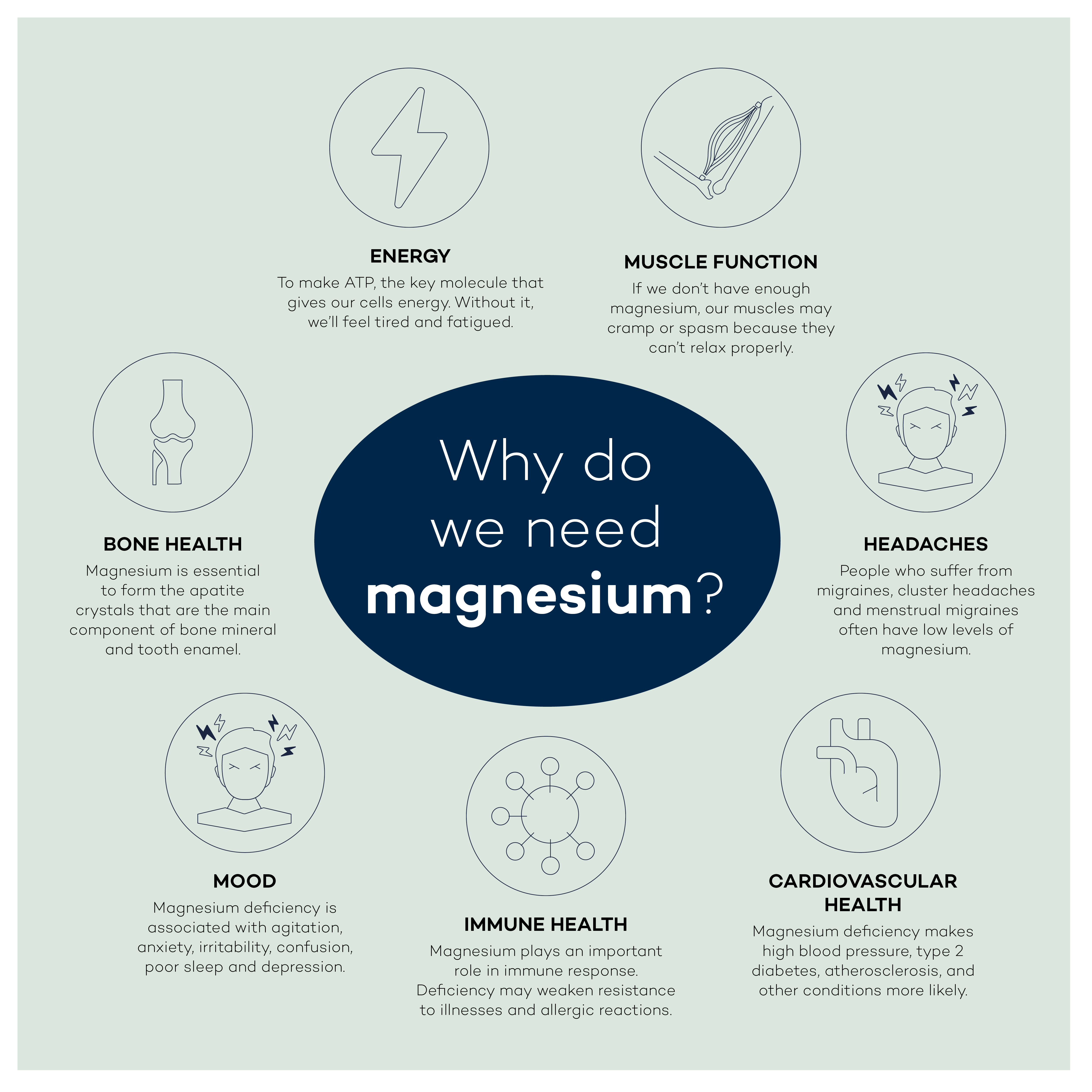
Magnesium: the definitive guide
Magnesium is an essential mineral that plays a vital role in many aspects of our health. This includes everything from maintaining a healthy metabolism and reducing tiredness and fatigue, to cell division, the nervous system, electrolyte balance, normal muscle function and even the maintenance of healthy bones and teeth.
But even though magnesium is found in many common foods, many of us in the UK just aren’t getting enough. Here’s an overview of why magnesium is so important to us, and how you can boost your intake.
- What is magnesium?
- What does magnesium do?
- How can I get enough magnesium?
- What are the effects of magnesium deficiency?
- Is it safe to take magnesium supplements?
- The best magnesium supplements – what to look out for
What is magnesium?
Magnesium (named after Magnesia, the region of Greece where it was first observed) is the eighth most common chemical element on Earth and the fourth most abundant mineral in the human body.
Recognised as a chemical element in 1755, magnesium was first isolated by the pioneering chemist Sir Humphry Davy in 1808.1 But people were aware of some of its health benefits as early as 1618, when a farmer from the English market town of Epsom realised that water from a bitter saline spring helped to heal cuts and rashes. It was later discovered that 'epsom salts' – still used to soothe sore muscles today – is actually magnesium sulphate.2
Magnesium is a micronutrient that is essential for life, and we need to consume magnesium regularly to ensure we have enough in our bodies. Magnesium is present in many foods, with whole grains, legumes and leafy vegetables being great sources of magnesium.3

What does magnesium do?
Our bodies contain on average around 25 grams of magnesium, but most of it is found in our bones and soft tissues, and only a small part (less than 1%) is found in our blood.4
We need magnesium for many functions in the body, including:
- the biochemical reactions in every cell
- mitosis, the process by which our cells divide to produce more cells for growth and repair
- producing energy and protein
- contributing to regulating the heartbeat
- maintaining the strength of bones and teeth
- maintaining a healthy neurological function
Getting enough magnesium may help with a number of common complaints.
Energy and muscle function
We need magnesium to make adenosine triphosphate (ATP), the molecule that gives living cells the energy they need to function and is essential for our metabolism. It’s also needed for the constant process of cell division that replaces dead cells with living ones.
This makes magnesium vital to the millions of chemical reactions that take place throughout the body.3
Magnesium is also important in recovery from strenuous exercise, like cycle racing, for example, because it helps with the enzymatic reactions that affect muscle performance. It may maintain muscle integrity during exercise too, protecting the muscles from damage.5
If the body doesn’t have enough magnesium, muscles may cramp or spasm because they can’t relax properly.6 That’s why magnesium is an important electrolyte for athletes.
Bone health
It’s well known that calcium is needed for strong and healthy bones but less so that magnesium is also essential, to form the apatite crystals that are the main component of bone mineral and tooth enamel.
About 60% of the body’s magnesium is stored in our bones, and too much or too little of it has a negative effect.
Magnesium may also be helpful for the role it plays in regulating two other nutrients important to forming and strengthening bones: calcium and vitamin D.7
Cardiovascular health
Magnesium plays an important role in the cardiovascular system, and together with calcium, is involved in heart cell function and blood pumping. Magnesium also influences endothelium-dependent vasodilation, which helps to control blood pressure.3
Many studies show that there is a relationship between magnesium deficiency and increased chances of developing high blood pressure, type 2 diabetes, dyslipidemia, atherosclerosis, arrhythmias, and coronary artery disease.8
Brain and neurological function
Magnesium is needed for the function of several neurotransmitters, including acetylcholine and GABA. Magnesium deficiency is associated with a whole range of psychological issues including agitation, anxiety, irritability, confusion, poor sleep and depression.9, 10
People who suffer from migraines and cluster headaches often have low levels of magnesium.11
Magnesium also plays a central role in cognitive function due to its central role in ATP formation and mitochondrial function. Epidemiologic data suggests that people with diets rich in magnesium may have a reduced risk of cognitive decline, but more data is needed to confirm this hypothesis.9

How can I get enough magnesium?
Magnesium is found in most foods, although there is no major food that provides a lot of magnesium. The foods richest in magnesium include whole grains, dark leafy vegetables (like spinach), nuts, legumes and potatoes.12
Other foods rich in magnesium include:
- Avocados
- Bananas
- Brown rice
- Dark chocolate
- Fish, icluding tuna and mackerel
- Porridge
Public Health England recommends that adult men from 19-64 need 300 mg of magnesium per day. Adult women need 270 mg. Older and younger people may require different amounts.13
Due to the role of magnesium in energy and muscle function, athletes and active people may need to consume higher levels of magnesium.
The UK National Diet and Nutrition Survey (NDNS) found that the majority of children and adolescents were failing to reach recommended levels of magnesium, with teenage girls particularly affected.14
But a further study of the NDNS showed that a high proportion of the UK population have low intakes of magnesium, among other micronutrients.15
Low magnesium levels are mainly caused by not getting enough magnesium in our daily diet and/or being unable to absorb enough.
Another reason for low magnesium levels is an increased loss through the kidneys, mainly due to kidney disease.
The population-wide decline in magnesium levels in the UK has been linked to modern intensive farming techniques which strip micronutrients from the soil. As a result, average magnesium levels in UK fruit and vegetables have declined by 10% since 1940.16
It has also been linked to the decreased consumption of vegetables and grains in favour of increased consumption of processed foods, which are low in nutrients and higher in sugars.17
Some people are more at risk of magnesium deficiency than others:
- Magnesium deficiency is quite common in older adults. The ageing gut is less efficient at absorbing magnesium, while at the same time, kidney dysfunction increases magnesium excretion, so we take in less and we lose more. Older people are also more likely to suffer from health issues and take medications that increase the risk of deficiency.9
- Alcoholics and very heavy drinkers are often deficient in magnesium. This seems to be related to damage to the liver and kidney, important organs for magnesium regulation, and to gastrointestinal problems that lead to impaired magnesium absorption.18
- People with increased insulin resistance and Type 2 diabetics tend to have low levels of magnesium, which has been linked to the development of Type 2 diabetes. Diabetics also experience greater loss of magnesium because of more frequent urination.19, 20
- People with gastrointestinal diseases, including those with coeliac, inflammatory bowel disease or Crohn’s disease are at risk of magnesium deficiency as the absorption of nutrients in the gut is often reduced.21
- People suffering from kidney issues. Deficiency is often an early sign of kidney disease problems as the kidney cannot filter magnesium and other electrolytes as efficiently.22
Long term use of some medications has also been linked to low levels of magnesium in the blood. For example, PPI (proton pump inhibitors), which are mainly prescribed for heartburn, have been shown to affect magnesium absorption.23 Other medications such as bisphosphonates (for osteoporosis), diuretics or immunosuppressants can increase the excretion of magnesium in the body.23
What are the effects of magnesium deficiency?
Magnesium plays such a wide-ranging role in so many aspects of our everyday health that the symptoms of deficiency can be broad and varied. They can include:
- Tiredness, fatigue and weakness
- Headaches
- Trouble sleeping
- Mood swings
- Muscle cramps
- Irregular heartbeat
Conversely, having too much magnesium in the body (called hypermagnesemia) can also lead to health problems.24 There is a fine balance in the body between the different minerals, particularly calcium and potassium, so too much magnesium will bring the level of other minerals, which can lead to symptoms such as:
- Nausea and vomiting
- Lethargy
- Irregular heartbeat
- Muscle weakness
- Low blood pressure
However, it’s rare to consume excessive magnesium from our diet. In most cases, hypermagnesemia occurs due to excessive consumption of magnesium supplements or medication, for example some types of laxatives.
People with chronic conditions such as kidney failure are more at risk of hypermagnesemia, as their bodies cannot fine-tune the amount of magnesium in the blood.
Is it safe to take magnesium supplements?
It’s best to try and get as much magnesium as we can from our daily diets. But that’s not always possible, and magnesium supplements can help us top up.
If you have a medical condition or are taking prescribed medication, you should always consult with your doctor. Magnesium can affect the absorption of some medications, including some varieties of antibiotics and statins
Interactions with medication are more likely if you take a supplement with a high magnesium content. A supplement with a lower amount of magnesium delivered in a more easily absorbable form makes interactions or side effects less likely.
People with kidney conditions shouldn’t take a magnesium supplement unless they’re recommended to by their doctor. Poorly functioning kidneys are unable to regulate electrolyte metabolism properly, and supplementation could lead to excessive magnesium levels.
However, for most of us, magnesium supplements are safe and can be a good ally to help us achieve the recommended intake of magnesium. Make sure to follow the recommended dose.
The European Food Safety Authority recommends a maximum dose of 250mg of magnesium from food supplements, particularly from magnesium salts.25
The best magnesium supplements – what to look out for
Magnesium can be difficult for our bodies to absorb, so when you’re choosing a supplement, keep an eye on claims about absorption, or ‘bioavailability’.
Taking a lot of magnesium to overcome the difficulty of absorption is not always the best solution – too much can cause some unpleasant gastrointestinal side effects.
A more bioavailable – or easy-to-absorb – supplement can help you obtain all the magnesium you need, so you can experience the benefits without taking too much of it.
Read this guide to learn more: ‘What kind of Magnesium supplement should I take?’
References
1. Jahnen-Dechent W, Ketteler M. Magnesium basics. Clin Kidney J. 2012;5(Suppl 1):i3–i14. doi:10.1093
2. Epsom Spa.
3. Fiorentini D, Cappadone C, Farruggia G, Prata C. Magnesium: Biochemistry, Nutrition, Detection, and Social Impact of Diseases Linked to Its Deficiency. Nutrients. 2021;13(4):1136. Published 2021 Mar 30. doi:10.3390/nu13041136
4. DiNicolantonio JJ, Liu J, O’Keefe JH Magnesium for the prevention and treatment of cardiovascular disease Open Heart. 2018;5(2):e000775. Published 2018 Jul 1. doi:10.1136/openhrt-2018-000775
5. Córdova A, Mielgo-Ayuso J, Roche E, Caballero-García A, Fernandez-Lázaro D. Impact of Magnesium Supplementation in Muscle Damage of Professional Cyclists Competing in a Stage Race Nutrients. 2019; 11(8):1927. doi.org/10.3390/nu11081927
6. Bilbey DL, Prabhakaran VM. Muscle cramps and magnesium deficiency: case reports. Can Fam Physician. 1996;42:1348-1351.
7. Castiglioni S, Cazzaniga A, Albisetti W, Maier JA. Magnesium and Osteoporosis: Current State of Knowledge and Future Research Directions Nutrients. 2013;5(8):3022-3033. Published 2013 Jul 31. doi:10.3390/nu5083022
8. Severino P, Netti L, Mariani MV, et al. Prevention of Cardiovascular Disease: Screening for Magnesium Deficiency. Cardiol Res Pract. 2019;2019:4874921. Published 2019 May 2. doi:10.1155/2019/4874921
9. Barbagallo M, Veronese N, Dominguez LJ. Magnesium in Aging, Health and Diseases. Nutrients. 2021;13(2):463. Published 2021 Jan 30. doi:10.3390/nu13020463
10. Botturi A, Ciappolino V, Delvecchio G, Boscutti A, Viscardi B, Brambilla P. The Role and the Effect of Magnesium in Mental Disorders: A Systematic Review. Nutrients. 2020;12(6):1661. Published 2020 Jun 3. doi:10.3390/nu12061661
11. Kirkland AE, Sarlo GL, Holton KF. The Role of Magnesium in Neurological Disorders. Nutrients. 2018;10(6):730. Published 2018 Jun 6. doi:10.3390/nu10060730
12. Volpe SL. Magnesium in disease prevention and overall health. Adv Nutr. 2013;4(3):378S-83S. Published 2013 May 1. doi:10.3945/an.112.003483
13. Government Dietary Recommendation.
14. National Diet and Nutrition Survey.
15. Bird JK, Barron R, Pigat S, Bruins MJ. Contribution of base diet, voluntary fortified foods and supplements to micronutrient intakes in the UK. J Nutr Sci. 2022;11:e51. Published 2022 Jun 23. doi:10.1017/jns.2022.47
16. Mayer AB, Trenchard L, Rayns F. Historical changes in the mineral content of fruit and vegetables in the UK from 1940 to 2019: a concern for human nutrition and agriculture. Int J Food Sci Nutr. 2022;73(3):315-326. doi:10.1080/09637486.2021.1981831
17. Schiefermeier-Mach N, Egg S, Erler J, et al. Electrolyte Intake and Major Food Sources of Sodium, Potassium, Calcium and Magnesium among a Population in Western Austria. Nutrients. 2020;12(7):1956. Published 2020 Jun 30. doi:10.3390/nu12071956
18. Vanoni FO, Milani GP, Agostoni C, Treglia G, Faré PB, Camozzi P, Lava SAG, Bianchetti MG, Janett S. Magnesium Metabolism in Chronic Alcohol-Use Disorder: Meta-Analysis and Systematic Review. utrients. 2021; 13(6):1959. doi.org/10.3390/nu13061959
19. Bertinato J, Wang KC, Hayward S. Serum Magnesium Concentrations in the Canadian Population and Associations with Diabetes, Glycemic Regulation, and Insulin Resistance Nutrients. 2017; 9(3):296. doi.org/10.3390/nu9030296
20. Sumaily KM. The Roles and Pathogenesis Mechanisms of a Number of Micronutrients in the Prevention and/or Treatment of Chronic Hepatitis, COVID-19 and Type-2 Diabetes Mellitus. Nutrients. 2022; 14(13):2632. doi.org/10.3390/nu14132632
21. Schuchardt JP, Hahn A. Intestinal Absorption and Factors Influencing Bioavailability of Magnesium-An Update. Curr Nutr Food Sci. 2017;13(4):260-278. doi:10.2174/1573401313666170427162740
22. Al Alawi AM, Majoni SW, Falhammar H. Magnesium and Human Health: Perspectives and Research Directions. Int J Endocrinol. 2018;2018:9041694. Published 2018 Apr 16. doi:10.1155/2018/9041694
23. Gröber U, Schmidt J, Kisters K. Magnesium in Prevention and Therapy. Nutrients. 2015;7(9):8199-8226. Published 2015 Sep 23. doi:10.3390/nu7095388
24. Cascella M, Vaqar S Hypermagnesemia. StatPearls Publishing. Updated 2022 May 30
25. EFSA NDA Panel. Tolerable upper intake levels for vitamins and minerals. 2006
